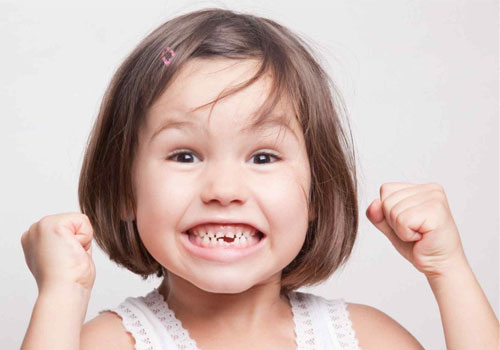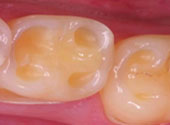Habitual grinding of teeth when the individual is not chewing or swallowing. Also used to indicate nonfunctional contact of teeth which may include clenching, gnashing, grinding and tapping of teeth.
SYNONYMS
- Karolyi effect
- Occlusal habit neurosis
- Bruxomania
TYPES
- Diurnal / Day time / Awake
- Nocturnal / Night time / Sleep

Bruxism during daytime is commonly a semivoluntary ‘clenching’ activity and is also known as ‘Awake Bruxism’ (AB) or Diurnal Bruxism (DB). Diurnal Bruxism is the subconscious grinding of teeth usually during the day associated with movements such as chewing pencils, nails, cheeks & lips
Bruxism during sleep is subconscious grinding of teeth during night time characterized by rhythmic patterns of masseter. Also known as Nocturnal Bruxism or Sleep Bruxism.
Get the best treatment from dentist in Guntur if your child is suffering from bruxism at best dental clinic in Guntur
OCCURRENCE
Common in infants
- Eruption of first primary tooth
- More prevalent in mixed dentition
Common during sleep
- Transition from deeper stages to lighter
- REM stage
ETIOLOGY
Local Factors
- Reaction to an occlusal interference
- High restoration, irritating dental condition
CNS
- Cortical lesions,
- Cerebral palsy,
- Mental retardation
Systemic
- GI disturbances leading to Chronic Abdominal distress
- Nutritional deficiencies - Mg deficiency
- Allergies - Food
- Endocrine disorders
Psychological theory
- Associated with feeling of anger, aggregation
- Stress
- Emotional status – inability to express the emotion
Other causes
- Genetics
- Enthusiastic student, compulsive overachiever
- Competitive sports
CLINICAL FEATURES
Occlusal trauma:
- Tooth mobility
- Spread of gingivitis
Tooth structure:
- Non - functional occlusal wear
- Increase tooth sensitivity
- Atypical wear facets
Muscular tenderness
TMJ disorders
Others signs and symptoms:
- Grinding/ tapping sounds
- Soft tissue trauma
- Headache
- Small ulcerations or ridging on the buccal mucosa



Visit Children dental hospital in Guntur if your child experiences the above symptoms
TREATMENT
Occlusal adjustments
- Coronoplasty, High point correction
- Occlusal splints (Night guard) - to cover occlusal surfaces

Reduction of increased muscle tone
- TMJ appliance- Prefabricated intra oral appliance for TMJ disorder
- Restorative - Severe abrasion - Pulp therapy, Stainless steel crown
Psychotherapy
- Counseling the child helps in tension relief & also creating habit awareness.
- Relaxing training-Tensing and relaxing exercise, Voluntary relaxation, Hypnosis, Behavior Conditioning
- Biofeedback -Positive feedback for Learning of tension reduction.
Drugs
- Vapocoolants – Ethyl chloride for pain -TMJ
- Local anesthetics
- Tranquilizers, sedatives, muscle relaxants
- Diazepam – Anxiety and alteration of sleep arousal
- Tricyclic antidepressants- Reduce REM
Others
- Electrical method-Electro galvanic stimulation
- Muscle relaxation-Acupuncture
- Orthodontic correction
Consult Dr. Ranjit Kumar who is the best pediatric dentist in Guntur at best children dental clinic in Guntur
- Nursing Bottle caries in children - Causes, Prevention & Treatment
- Clear Aligners - The invisible way to fix your teeth
- Invisible Braces/ Aligners for correction of Teeth alignment
- BRUXISIM
- Smile Designing
- Immediate Loading Strategic Implantology
- All about Teeth Whitening
- Tooth Sensitivity treatment and Causes
- Significance of Oral hygiene during pregnancy
- All about ROOT CANAL TREATMENT Myths Debunked
- How Carbonated drinks can affect your Oral health & Smile?
- Dilemma of Wisdom Teeth Removal
- Seeking dental treatment for Gum problems in Guntur
- Immediate teeth replacement with Dental Implants in Guntur
- Interesting Myths and Facts About Dental Implants
- Postoperative care of dental implants
- Replacing Missing Tooth
- Efficacy Of Aligners
- Dental Implant Treatments
- Dental Implants & Orthodontic Treatment
- TMJ Disorders
- JAW CORRECTIVE TREATMENT (Orthognathic Surgery)
- Do You Want To Do Something About The Open Gap In Your Smile??
- Benefits Of Dental Implants
- Procedures Involved In Dental Implants
- Your Children’s Dentist In Guntur
- What is the cost of Root canal Treatment (RCT) in Guntur?
- Cost of Wisdom Tooth Removal in Guntur
- Fighting Bad breath and how do I overcome it!!!
- Why are Corticobasal Implants better than Regular Conventional Implants?
- DOs & DONTs After Root Canal Treatment
- Tilted Implantology- All on X, for full mouth rehabilitation !

